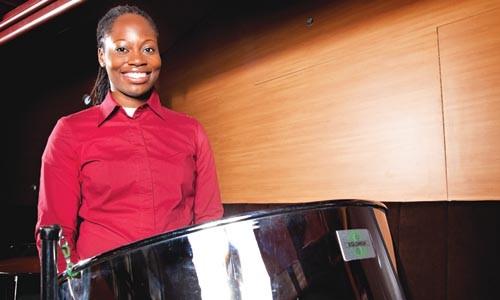A local woman is hoping that the sounds of steelpan drums can revitalize one of the city's most historic homes and the lives of young people.
The National Opera House, located on the border of Homewood and Lincoln-Lemington -- and once the home of the National Negro Opera Company -- has sat vacant for years. But now Jonnet Solomon-Nowlin, the building's owner, believes her family's U.S. Steelpan Academy can add value and structure to young lives, while bringing attention to the neighborhood's often-overlooked past.
Steelpan drums were invented in the Caribbean -- in countries like Guyana, and Trinidad and Tobago -- during the 1930s. Steelpans were originally crafted from discarded 55-gallon oil drums. To achieve their signature pitched sound, two rubber-tipped mallets strike the surface of the pan, where notes have been marked onto the stretched steel surface.
Starting at the age of 14, Solomon-Nowlin's father, Phil Solomon, founded several steelbands in Guyana; he was named Musician of the Year in 1971. After moving to Pittsburgh in 1984, he founded Solomon Steelpan Company and began manufacturing steel drums for organizations throughout the country. Solomon was the first manufacturer of steelpans in Pittsburgh.
After dedicating years to this instrument, Solomon wants the next generation to take over.
"The whole idea of the academy," he says, "is to launch the steelpan into the 21st century, for me to pass this knowledge on to younger people."
Solomon-Nowlin hopes not only to pass on that knowledge, but to teach young people a skill that can add value to their community.
"I would like to see steelpan and the arts and music help young people," Solomon-Nowlin says, "by giving them an opportunity to express themselves through art."
While she's working to restore the Opera House, for the past several years Solomon-Nowlin has been able to teach lessons through community partnerships. And when she begins a new series of classes at the East End's Union Project this month, it will be a step closer to running the academy within the National Opera House.
The Union Project lessons are important, she says, "and the first set of students will be a marketing piece for the house."
Using the house as the home base for the Steelpan Academy makes sense. After all, the building has always had a role in the emerging African-American art scene, especially during the previous century.
The three-story Victorian home sits on a terrace overlooking Homewood. Built in the Queen Anne style in 1894, it was home to many prominent black Pittsburghers over the years, including Roberto Clemente, Lena Horne and Woogie Harris, brother of famed photographer Charles "Teenie" Harris.
But its most significant tenant was Mary Cardwell Dawson's National Negro Opera Company. Launched in 1941, the NNOC was the first African-American opera company in the country. The NNOC held productions for 21 years and traveled to Washington, D.C., New York City and Chicago.
Solomon-Nowlin says she learned about this history through the advocacy efforts of the Young Preservationists Association of Pittsburgh (YPA) and the group's executive director, Dan Holland.
The YPA is a preservation group that encourages young people to be involved in researching, documenting and eventually restoring historic places. Once a year, the organization releases a Top Ten list of the best opportunities for preservation in the region. In 2003, the Opera House was on that list.
"Their Top Ten list and the education around it, and why it's important to preserve," Solomon-Nowlin says, "is one of the key things that brought awareness to the project. They were able to reach a lot of people."
And that's what Solomon-Nowlin is hoping to do with Steelpan.
The Young Men and Women's African Heritage Association, headquartered on Pittsburgh's North Side, has been teaching steelpan for 15 years, and the Solomon family has been involved since the beginning. Lessons were first taught by Phil Solomon and later his daughters, Janera and then Jonnet. Jonnet gives lessons on Saturdays at the New Hazlett Theatre.
Janice Parks, executive director of the heritage association, says the steelpan is a good fit for her students.
"It's an easily accessible instrument," Parks says. "You don't have to have years and years of experience to be great. [Students] can pick up two mallets and an hour later they can play the melody line of a tune that's familiar to them."
Adam Warble, an instructor at the academy, agrees, and says "it's definitely a popular instrument -- it's fun." Warble says that his young students get particularly excited when he mentions current hip-hop songs that feature steelpan. But Phil Solomon stresses the versatility of the instrument. "Steelpan was actually created to play classical music," he says.
Parks says her students learn to play everything from "Bach and Beethoven to Stevie Wonder."
When the academy begins teaching at the Opera House, Warble thinks it will be "absolutely wonderful. Especially since the steelpan was invented in the Caribbean" -- where the culture is heavily influenced by the African diaspora. "[And] since [the home] was a hub of African-American cultures, I think it's wonderful to bring that back to the Opera House."
The next step is bringing back the house itself. Solomon-Nowlin has recently hired grant-writers to find funding for the home's restoration. Architects, electricians and carpenters have all agreed to work with her, and some have already donated time to the project.
Now, she just needs to raise enough money to begin the restoration, and to begin turning the Opera House back into a home for music. But she's quick to point out that because her forte is music, she can use all the help she can get on the restoration side of this dream.
"I'm not in the preservation business," she says with a laugh, "I'm just in it by default. My key thing is to just make sure it's preserved. We really have to push forward."















